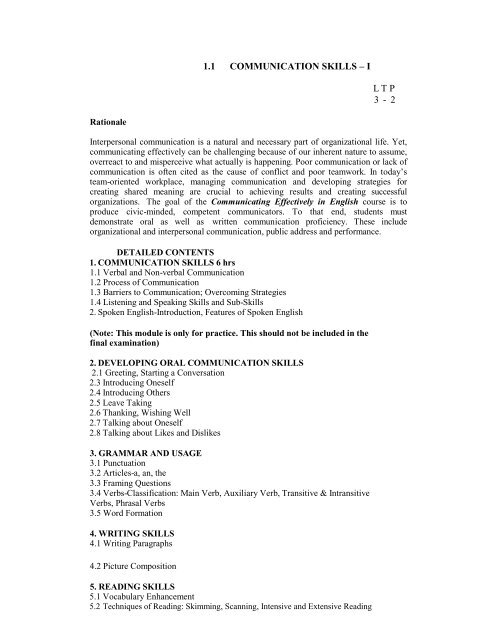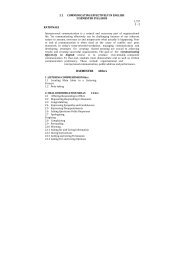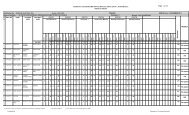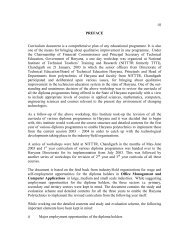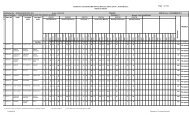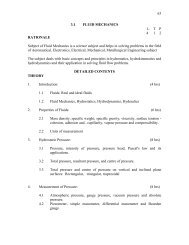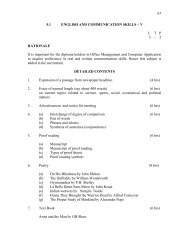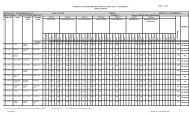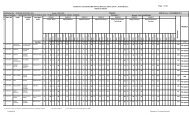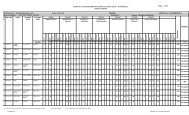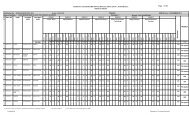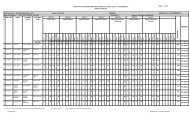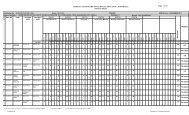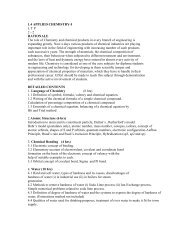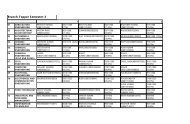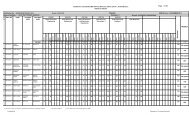1.1 COMMUNICATION SKILLS â I L T P 3 - 2 - hsbte
1.1 COMMUNICATION SKILLS â I L T P 3 - 2 - hsbte
1.1 COMMUNICATION SKILLS â I L T P 3 - 2 - hsbte
Create successful ePaper yourself
Turn your PDF publications into a flip-book with our unique Google optimized e-Paper software.
<strong>1.1</strong> <strong>COMMUNICATION</strong> <strong>SKILLS</strong> – I<br />
L T P<br />
3 - 2<br />
Rationale<br />
Interpersonal communication is a natural and necessary part of organizational life. Yet,<br />
communicating effectively can be challenging because of our inherent nature to assume,<br />
overreact to and misperceive what actually is happening. Poor communication or lack of<br />
communication is often cited as the cause of conflict and poor teamwork. In today’s<br />
team-oriented workplace, managing communication and developing strategies for<br />
creating shared meaning are crucial to achieving results and creating successful<br />
organizations. The goal of the Communicating Effectively in English course is to<br />
produce civic-minded, competent communicators. To that end, students must<br />
demonstrate oral as well as written communication proficiency. These include<br />
organizational and interpersonal communication, public address and performance.<br />
DETAILED CONTENTS<br />
1. <strong>COMMUNICATION</strong> <strong>SKILLS</strong> 6 hrs<br />
<strong>1.1</strong> Verbal and Non-verbal Communication<br />
1.2 Process of Communication<br />
1.3 Barriers to Communication; Overcoming Strategies<br />
1.4 Listening and Speaking Skills and Sub-Skills<br />
2. Spoken English-Introduction, Features of Spoken English<br />
(Note: This module is only for practice. This should not be included in the<br />
final examination)<br />
2. DEVELOPING ORAL <strong>COMMUNICATION</strong> <strong>SKILLS</strong><br />
2.1 Greeting, Starting a Conversation<br />
2.3 Introducing Oneself<br />
2.4 Introducing Others<br />
2.5 Leave Taking<br />
2.6 Thanking, Wishing Well<br />
2.7 Talking about Oneself<br />
2.8 Talking about Likes and Dislikes<br />
3. GRAMMAR AND USAGE<br />
3.1 Punctuation<br />
3.2 Articles-a, an, the<br />
3.3 Framing Questions<br />
3.4 Verbs-Classification: Main Verb, Auxiliary Verb, Transitive & Intransitive<br />
Verbs, Phrasal Verbs<br />
3.5 Word Formation<br />
4. WRITING <strong>SKILLS</strong><br />
4.1 Writing Paragraphs<br />
4.2 Picture Composition<br />
5. READING <strong>SKILLS</strong><br />
5.1 Vocabulary Enhancement<br />
5.2 Techniques of Reading: Skimming, Scanning, Intensive and Extensive Reading
SEMESTER-I<br />
1.2 BUSINESS ORGANIZATION<br />
L T P<br />
Hrs / weeks 4 2 -<br />
Module Rationale<br />
The purpose of the subject is to develop an understanding of basic concept of<br />
Business, Commerce and Industry.<br />
Detailed Contents<br />
1. Concept of business, trade, commerce & industry & importance. Distinctive<br />
features of different forms of business organization, The essential requisite for<br />
business success;<br />
2. Sole proprietor, partnership- characteristics, registration, partnership deed,<br />
partner’s rights, duties and liabilities, dissolution of partnership. Commerce in<br />
Indian organization of business.<br />
3. Joint stock companies –Concept, characteristics, types, formation of company.<br />
4. Co-operative and state ownership: forms of organization, nonprofit organizations, forms of<br />
business organizations in new millennium. Acquisition & Mergers.<br />
Note: At least two visit to industry/field in a semester<br />
Suggested Books<br />
C.R. Basu : Business Organization & Principles of Management<br />
P.C. Tulsian & Vishal Pandey : Business Organization & Management<br />
Y.K. Bhushan : Fundamentals of Business organization<br />
& Management<br />
C.B. Gupta : Business Organization & Management<br />
Tutorial Assignment<br />
1. Prepare a partnership deed<br />
2. Explain Business organizations<br />
3. Explain Non profit organizations<br />
4. Concept of Business, Trade, Commerce & Industry
SEMESTER-I<br />
1.3 PRINCIPLES OF MANAGEMENT<br />
L T P<br />
Hrs / weeks 4 2 -<br />
Module Rationale<br />
The study and understanding of principles, concepts and functions of management is very<br />
essential for the management students. The basic knowledge of this subject will enable students<br />
to take effective steps for performing various office duties.<br />
Detailed Contents<br />
1. Management : An Introduction : Meaning, definitions, characteristics, Objectives,<br />
Importance of Management, Level of Management, Skills of Management,<br />
Management Vs Administration, Principle of Management<br />
2. Managerial Planning : Meaning, objectives, nature, importance and elements of<br />
planning, planning process, requisites of effective planning<br />
3. Organizing : Nature, Characteristics, purpose, importance of organizing, steps in<br />
organizing process<br />
4. Staffing : Nature, Scopes and significance of staffing, meaning, nature and<br />
significance of manpower planning<br />
5. Directing : Concept, characteristics and importance of directing, principles and<br />
techniques of directing<br />
6 Controlling : Meaning, definitions, nature, objectives and importance of control,<br />
control process, essentials for an effective control system<br />
7. Coordination: Meaning, nature, characteristics, need & significance of<br />
coordination, coordination, process of coordination.<br />
Suggested Books<br />
Principles of Management : C.B. Gupta<br />
Principles & Practice of Management : L.M. Prasad<br />
Principles & Practice of Management : T.N. Chhabra<br />
Tutorial Assignment<br />
1. Importance of Management<br />
2. Requisites of effective planning<br />
3. Principles of Management<br />
4. Elements of planning<br />
Note:<br />
Visit an Industrial Organization<br />
Teacher may invite experienced managers from Industries and other<br />
organizations to deliver extension lectures.
SEMESTER-I<br />
1.4 BUSINESS ECONOMICS<br />
L T P<br />
Hrs / weeks 4 2 -<br />
Module Rationale<br />
The objective of this subject is to make familiar the students with the basic concept of economics prevailing<br />
in the business world. They will learn about consumption, production, market, utility and competition etc.<br />
Detailed contents<br />
1. Managerial Economics: Meaning, nature and scope. Objectives of firm, equilibrium, opportunity<br />
cost, marginal and incremental principles.<br />
2. Theory of Demand: types of demand, determinants of demand, individual demand, and market<br />
demand. Law of demand, Elasticity of demand and its determinants. Change in demand, demand<br />
forecasting-introduction.<br />
3. Utility: Types of utility, Law of diminishing, Marginal Utility.<br />
4. Theory of production and costs: Concept of production function, Law of variable proportion & relation to scale,<br />
theory of cost in short run and long run, revenue function.<br />
5. Characteristics of perfect competition, Monopoly, Monopolistic Competition, Oligopoly.<br />
Suggested Books<br />
1. Koutsoyiannis : Modern Microeconomics<br />
2. Varshney & Maheshwari : Managerial Economics<br />
3. Mote, Paul & Gupta : Managerial Economics<br />
4. Ferguson & Gould : Micro Economics<br />
Tutorial Assignment<br />
1. Elasticity of demand and factors which determine elasticity of demands<br />
2. Application of law of diminishing marginal utility<br />
3. Explain income and price effect<br />
4. Explain factors of production<br />
5. Explain monopoly and monopolistic competition<br />
SEMESTER-I<br />
1.5 BUSINESS MATHEMATICS & STATISTICS
L T P Hrs / weeks 4<br />
2 -<br />
Module Rationale<br />
Mathematics is very essentials for all kind of business transactions as it is the backbone of all<br />
commercial activities.<br />
Detailed Contents<br />
1. Introduction to business mathematics, Scope and importance of business mathematics. Concept of<br />
profit and loss Terms and formulas, and simple problems.<br />
2. Simple Interest, Compound interest (Reducing Balance and flat interest, rate of interest) Equated monthly<br />
installment (EMI) and problems.<br />
3. Definition of matrix, types of matrices, addition of matrices, multiplication of a matrix by Non zero<br />
scalar, subtraction of matrices and numerical.<br />
4. Definition of statistics, it scope in management & limitation of statistics.<br />
5. Measures of central tendency: mean, mode, medium, geometric mean, harmonic mean, arithmetic<br />
mean.<br />
6. Measures of Dispersion-quartile deviation, average deviation and standard deviation-relative<br />
measures of dispersion.<br />
Suggested Books<br />
1. Elementary Mathematics of Class 10+2 CBSE New Delhi<br />
2. Business Statistics by R.P. Hooda<br />
Tutorial Assignment<br />
The Teacher must give at least five problems of each topic as home assignment to be done independently by<br />
the student and side wise evaluation of the same must take place regularly.<br />
Semester - I<br />
1.6 COMPUTER FUNDAMENTALS<br />
L T P Hrs / weeks 2 -<br />
4
Module Rationale<br />
This subject will expose the students to various aspects of operating computers and its use in<br />
corporate sector. This will enable the students to develop the skills to handle and manipulate various kinds of<br />
data and information. It will also update the knowledge of the students related with cyber laws.<br />
Note:<br />
1. Teaching of Theory should be dovetailed with practical work. There will be a theory exam also.<br />
2. The following topics may be taught in the laboratory along with the practical exercises.<br />
Detailed Contents<br />
1. Computer organization, block diagram of a computer, CPU, Memory, Input devices, keyboard,<br />
mouse, output devices, Visual Devices and printer, scanner.<br />
2. Special features, various applications of MS –word and MS-Excel, Power-point<br />
3. Local Area Networks and Data-nets<br />
Basic of Networking – LAN, WAN, Topologies<br />
Types of LAN<br />
Network Components<br />
Network Topology<br />
4. Mail and message System: E-mail, Document and Picture transmission, Voice mail<br />
Suggested Books:<br />
1. Fundamental of computer : V Rajaraman<br />
2. MS Office for everyone : Sanjay Saxena<br />
List of Practical<br />
1. Give a PC, name its various components and list their functions.<br />
2. Identification of various parts of a computer.<br />
3. Practice in installing a computer system by giving connection and loading the system software and<br />
application software.<br />
4. Installation of Window 98, 2000 etc.<br />
(1) Features of Windows as an operating System<br />
- Start<br />
- Shut Down and Restore<br />
- Creating and operating on the Icons<br />
- Opening, closing and sizing the windows
- Using Elementary job commands like creating, saving, modifying, renaming,<br />
finding and deleting a file.<br />
- Creating and operating on a folder<br />
- Changing setting like date, time color (background and foreground)<br />
- Using shortcuts<br />
- Using on-line help<br />
5. MS Word<br />
- File Management<br />
Opening, Creating and saving a document, locating files, copying contents in some different<br />
files, protecting files, giving password protection for a file.<br />
- Page setup<br />
- Editing a document<br />
- Formatting a document<br />
Using different fonts, changing font size and color, changing the appearance through<br />
bold/Italic/underlined, highlighting a text, changing case, using subscript and<br />
superscript, using different underline methods.<br />
- Aligning of text in a document, justification of document, inserting bullets and numbering<br />
- Formatting paragraph, inserting page break and column breaks<br />
- Use of Headers, Footers<br />
- Inserting date, time, special symbols, importing graphic images, drawing tools<br />
- Table and borders<br />
- Print preview, Zoom, page setup, Printing options<br />
- Using Find , replace options<br />
6. MS Excel<br />
7. Internet and its application<br />
Starting Excel, open worksheet, enter Edit data formulas to calculate values format data, create<br />
Chart, Printing Chart, Save worksheet, switching from other spreadsheet.<br />
8. E-mail : Create E-mail account with different user mails
Semester- II
2.1 <strong>COMMUNICATION</strong> <strong>SKILLS</strong> – II<br />
L T P<br />
4 - 2<br />
Rationale<br />
Interpersonal communication is a natural and necessary part of organizational life. Yet communicating<br />
effectively can be challenging because of our inherent nature to assume, overreact to and misperceive what<br />
actually is happening. Poor or lack of communication is often cited as the cause of conflict and poor<br />
teamwork. In today’s team-oriented workplace, managing communication and developing strategies for<br />
creating shared meaning are crucial to achieving results and creating successful organizations. The goal of<br />
the Communicating Effectively in English course is to produce civic-minded, competent communicators.<br />
To that end, students must demonstrate oral as well as written communication proficiency. These include<br />
organizational and interpersonal communication, public address and performance.<br />
1. LISTENING COMPREHENSION<br />
<strong>1.1</strong> Locating Main Ideas in a Listening Excerpt<br />
1.2 Note-taking<br />
2. ORAL <strong>COMMUNICATION</strong> <strong>SKILLS</strong><br />
2.1 Offering-Responding to Offers<br />
2.2 Requesting-Responding to Requests<br />
2.3 Congratulating<br />
2.4 Expressing Sympathy and Condolences<br />
2.5 Expressing Disappointments<br />
2.6 Asking Questions-Polite Responses<br />
2.7 Apologizing, Forgiving<br />
2.8 Complaining<br />
2.9 Persuading<br />
2.10 Warning<br />
2.11 Asking for and Giving Information<br />
2.12 Giving Instructions<br />
2.13 Getting and Giving Permission<br />
2.14 Asking For and Giving Opinions<br />
3. GRAMMAR AND USAGE<br />
3.1 Prepositions<br />
3.2 Pronouns<br />
3.3 Determiners<br />
3.4 Conjunctions<br />
3.5 Question and Question Tag<br />
3.6 Tenses (Simple Present, Simple Past)<br />
*One chapter revising the topics discussed during the first semester.<br />
(Punctuation, Articles, Framing questions, Verbs, Word formation)
4. WRITING <strong>SKILLS</strong><br />
4.1 Writing Notice<br />
4.2 Writing Circular<br />
4.3 Writing a Memo<br />
4.4 Agenda for a Meeting<br />
4.5 Minutes of the Meeting<br />
4.6 Telephonic Messages<br />
* Writing a paragraph will be a continuous exercise through out the session.<br />
(Writing will be based on verbal stimuli, tables and graphs.)<br />
5. READING <strong>SKILLS</strong><br />
5.1 Vocabulary Enhancement<br />
5.2 Techniques of reading: Skimming, Scanning, Intensive and Extensive Reading.
Module Rationale<br />
2.2 Basic Managerial Skills<br />
L T P<br />
Hrs / weeks 4 2 -
The study and understanding of basis managerial skills is very essential for the students.<br />
Detailed Contents<br />
1. Team & team work :<br />
Meaning, features, types of team, team work, team building, members, team<br />
development, team functioning, group formation.<br />
2. Stress Management:<br />
Meaning, nature symptoms, causes, consequences of stress, removing / overcoming of<br />
stress, management of stress, conflict in organization, conflict management.<br />
3. Time Management:<br />
Meaning, Nature & importance of time management.<br />
4. Decision Making :<br />
Meaning, importance & characteristics of decision making, steps in decision- making<br />
process.<br />
5. Leadership:<br />
Definitions and feature of leader, Need or importance of Leadership, leadership style,<br />
Characteristics or traits of effective leader.<br />
Suggested Books:<br />
1. Organizational Behaviour : T. N. Chabbra<br />
2. Principles of Management: C.B.Gupta<br />
Tutorial Assignment:<br />
1. Meaning of team.<br />
2. What is stress management.<br />
3. What are the causes of stress.<br />
4. Importance of time management.<br />
5. Define leadership.
Module Rationale<br />
2.3 BUSINESS ENVIRONMENT<br />
L T P<br />
Hrs / weeks 4 2 -<br />
This will groom the students about globalization, privatization, monetary, fiscal, technological<br />
and other macro and micro business environment<br />
Detailed Contents<br />
1. Business Environment: Meaning, nature, scope and objectives of Business environment.<br />
2. Globalization and Liberalization of Indian Economics and its impact on Business and Trade.<br />
3. Technological Environment: features, impact & status of technology in India.<br />
4. Privatization: nature, objectives, history of Privatization<br />
5. Monetary and Fiscal Policy: Monetary Policy, Money market or Fiscal Policy.<br />
6. E-commerce environment in India<br />
Suggested Books:<br />
Essentials of Business Management : K. Awasthapa<br />
Tutorial Assignment<br />
1. Explain Business Environment<br />
2. Objectives of Business environment.<br />
3. Impact of Globalization on Business<br />
4. E-commerce environment in India<br />
Note : Industry Visits
2.4 ORGNAIZATIONAL BEHAVIOUR<br />
Module Rationale<br />
L T P<br />
Hrs / weeks 4 2 -
The main objective of this course is to familiarize the students with basic concepts of human behavior,<br />
principle practices and organizational processes on behavioral dimensions.<br />
Detailed Contents<br />
1. Introduction:<br />
Meaning of organizational Behaviour, Definition, importance, nature & scope of organizational<br />
Behaviour, Understanding people and organization<br />
2. Individual Behaviour :<br />
Personality and its influence on organizational behaviour, Characteristic of Personality.<br />
3. Attitude:<br />
Meaning of Attitude<br />
4. Group Dynamics:<br />
Formal organization, Informal organization, definitions, nature & Understanding of groups, Types of<br />
groups, reasons for formation of groups, importance of groups to the organization, group cohesiveness,<br />
factors influencing group cohesiveness, quality circle, benefit of quality circles.<br />
5. Organization Development:<br />
Characteristics, need of Organization Development, steps in Organization Development, Change agent,<br />
Role of change agent.<br />
6. Organizational Culture:<br />
Concept, characteristic, Need, factors influencing climate and culture.<br />
Suggested Books<br />
1. Organizational Behavior : T.N.Chabbra<br />
2. Human Resources Management : V.S.P. Rao<br />
3. Organizational Behavior : K. Aswathapa<br />
Tutorial Assignment<br />
1. How to overcome stress.<br />
2. What is personality.<br />
3. Formal vs Informal organization<br />
4. Explain quality circle<br />
Group work and presentation and role plays on general functions and duty of managers involving<br />
their attitudes personality and behaviour.
Module Rationale<br />
2.5 ACCOUNTING FUNDAMNETALS<br />
L T P<br />
Hrs / weeks 4 2 -
This module aims to explain the basics of accounting to students. It introduces the basic<br />
terminology related to financial statements, the book keeping process & key accounting tasks etc.<br />
Detailed Contents<br />
1. Basic Accounting: nature, scope and objectives of accounting, accounting as information system,<br />
users of accounting information. Accounting equation, accounting concepts and conventions. Principles<br />
of financial accounts.<br />
2. Journal and Ledger: Double entry system, journal and recording of entries in journal with narration,<br />
Ledger-posting from journal to respective ledger accounts.<br />
3. Trail Balance: need and objectives, Application of Trial Balance, Different types of errors escaped<br />
trail balance preparation, Rectification of errors.<br />
4. Final Accounts: concept of adjustment, preparation of Trading Account and Profit and Loss Account.<br />
Preparation of Balance Sheet.<br />
Suggested Books:<br />
1. +1 Accountancy : D.K. Goel, Rajesh Goel<br />
2. An Introduction to Accountancy : S.N.Maheshwari<br />
3. Fundamental of Accounting : Mukherjee & Hanif<br />
Tutorial Assignment<br />
1. Objective of Accounting<br />
2. Preparation of Balance Sheet<br />
3. Principle of Financial Accounts<br />
4. Preparation of trading account and profit and loss count<br />
Note : Question Paper should have at least two Numerical problems
Module Rationale<br />
2.6 COMPUTER APPLICATIONS<br />
L T P<br />
Hrs / weeks 2 - 4
Computer plays a very vital role in present day life, more so, in the<br />
professional life of management diploma holders. In order to enable the students use the<br />
computers effectively in problem solving, this course offers the modern programming<br />
language C along with exposure to various engineering application of computers.<br />
Detailed<br />
Content<br />
s<br />
1. Algorithm and program Development:<br />
1) Steps in development of a programme.<br />
2) Flow- Charts, algorithm development.<br />
3) Programme Designing.<br />
4) Introduction to computer languages, interpreter, complier<br />
HLL/ML/Assembly language.<br />
2. Programme Structure (C Programming)<br />
3. I/O statements, assignment, variables, arithmetic operation- their precedence,<br />
Data types standard I/O function, formulated I/O.<br />
4. Control Statements:<br />
If else logical and relational operators while do- while, breaks switch statements.<br />
1. Functions:<br />
Function declaration, parameter passing cell- by value storage classes (local,<br />
global and static variables).<br />
2. Arrays<br />
Single and multi dimensional arrays, character arrays.<br />
3. Pointers:<br />
Pointers to various data types, pointers in parameter passing pointers to function.<br />
4. Structures:<br />
Definition of a structure, pointers to structure, and union, array of structure.<br />
5. Strings:<br />
Strings processing, functions and standard library functions.<br />
6. Files:<br />
File manipulation using standard function type mousse.
LIST OF<br />
PRACTICALS<br />
1. Use of spread sheet/Matlan/Mathematical/Eureka (or any other package) for<br />
engineering computers.<br />
2. Use of design packages (appropriate design packages may be selected<br />
depending upon the availability) on Estimating and Costing, Analysis of rates and<br />
other areas.<br />
3. Use of CAI packages.<br />
4. Programming for DAS and control.<br />
5. Exercise on data acquisition.<br />
6. Exercise on control- on/off switch, and proportional control.<br />
7. Programming exercise on executing C programme.<br />
8. Programming exercise on editing C programme.<br />
9. Programming exercise on defining variables and assigning values to variables.<br />
10. Programming exercise on arithmetic and relational operators.<br />
11. Programming exercise on arithmetic expressions and their evaluation.<br />
12. Programming exercise on reading a character.<br />
13. Programming exercise on writing a character.<br />
14. Programming exercise on formatting input using print<br />
15. Programming exercise on formatting output using scan.<br />
16. Programming exercise on simple if statement.<br />
17. Programming exercise on IF……else statement.<br />
18. Programming exercise on switch statement.<br />
19. Programming exercise on go to statement.<br />
20. Programming exercise on do- while statement.<br />
21. Programming exercise on for statement.<br />
22. Programming exercise on one- dimensional arrays.<br />
23. Programming exercise on two- dimensional arrays.<br />
Suggested books:<br />
1. Programming in C by Sachaum series McGraw Hills.<br />
2. Programming in C by Manapatra, Khanna Publishers New Delhi.<br />
3. Elements of C by M.H.Lewin, Khanna Publishers New Delhi.<br />
4. Vijay Mukhi Series for C & C++.
Semester- III
SEMESTER-III<br />
3.1 PRODUCTION MANAGEMENT<br />
L T P Hrs / weeks 4 1 -<br />
Module Rationale<br />
To keep the student abreast with the basic concepts of production<br />
management, production planning and control and inventory management etc.<br />
Detailed Contents<br />
1. Production Management: Concept, role, relevance and scope of production management, different<br />
types of production, production facilities, plant location, plant layout.<br />
2. Production, planning and control, 2.1 Concept of PERT and CPM (Introduction)<br />
2.2 Routing, scheduling and dispatching 2.3 Concept of value addition.<br />
3. Inventory management- Objective and techniques of Inventory management, Just In Time (JIT)<br />
concept, First in First out (FIFO), Last in Last out (LIFO).Economic order quantity(EOQ), ABC analysis,<br />
reorders point, short shelf life items, Bin card system.<br />
Suggested Books:1. Production and operation management : BS Goel 2. Production<br />
Management : Lockyar
SEMESTER-III<br />
3.2 TOTAL QUALITY<br />
MANAGEMENT<br />
L T P Hrs / weeks 4<br />
1 - Module Rationale<br />
The main objective of the course is to familiarize the students with various<br />
aspects of total quality management. The students are to be made aware of various aspects of<br />
total quality management and their implications.<br />
Detailed Contents<br />
1. Introduction: definition of quality, total quality, and total quality management, total quality<br />
management gurus-Deming, Juran, Crosby, Taguchi, Ishikawa, Feigenbaum. Evolution of<br />
quality concept, need for quality management in context of ongoing reform processes.<br />
2. Components of Total Quality Management: Total employee involvement, statistical quality<br />
control, just in time and waste elimination.<br />
3. Cost of Quality: Failure cost, appraisal cost, prevention cost and others.<br />
4. Miscellaneous Aspects of Total Quality Management: ISO 9001: 2001-quality management<br />
system, Elementary Knowledge of KAIZEN; Plan, Do, Check, Act Cycle (PDCA Cycle)<br />
Suggested Books:<br />
1. Total Quality Management : Dr. DD Sharma 2. Total Quality Control<br />
Essentials : Sarv Singh Soni, McGraw Hill, New YorkTutorial<br />
Assignments:<br />
1. Prepare a case study of a company which has obtained ISO-9001
LAW<br />
Hrs / weeks 4 1<br />
SEMESTER-III 3.3 BUSINESS<br />
L T P<br />
- Module Rationale<br />
This will update the knowledge of students about the laws related to business. The<br />
knowledge of different business laws are very essential for the survival and growth of any<br />
organization. It gives confidence, clarity in decision making.<br />
1. Indian contract Act,1872.<br />
Essentials of a contract.<br />
Offer & Acceptance.<br />
Capacity of Parties.<br />
Free Consent.<br />
2. Sale of Goods Act 1930.<br />
Nature of contract of sale.<br />
Conditions & warranties<br />
Transfer of ownership & delivery.<br />
Rights of an unpaid seller.<br />
3. Indian partnership Act,1932<br />
Definition & registration of partnership.<br />
Rights, duties & Liabilities of partners.<br />
Dissolution of partnership firm<br />
4. The companies Act, 1956.<br />
Nature & types of company.<br />
Formation of a company.<br />
Memorandum of association.<br />
Prospectus & allotment of shares.<br />
Meeting of proceeding.<br />
5.Negotiable Instrument Act.1881.<br />
Negotiable instruments & it parties.<br />
Detailed contents
Promissory notes, bills of exchange & cheques<br />
Negotiation.<br />
Presentment & Discharge<br />
6. The consumer protection Act (out line only)<br />
Suggested Books<br />
Elements of Mercantile Law : N.D. KapoorBusiness Law<br />
: M C KuchhalTutorial Assignments<br />
Teacher of concerned subject is required to give tutorial assignments on all major areas of the<br />
above syllabi to the students
SEMESTER-III 3.4<br />
FINANCIAL MANAGEMENT<br />
L T P Hrs / weeks 4 1<br />
- Module Rationale<br />
The objective of this subject is to acquaint the students with the basic concepts of Finance to<br />
enable them in taking decisions in their jobs. This exercise will be used to develop<br />
computational ability and analytical skill in this field.<br />
Detailed Contents<br />
1. Financial Management: meaning, nature, scope of finance, functions, its relationship with<br />
other areas, functions of financial executives, organizational structure of finance department.<br />
2. Working capital management: Definition, need for working capital, factors effecting<br />
working capital, advantages of adequate working capital and disadvantages of access and<br />
inadequate working capital, management of working capital, analysis of working capital,<br />
forecast.<br />
3. Budget and Budgetary Control: Meaning, advantage, preparation of various types of<br />
budgets, break even analysis, advantages and limitations of the break even analysis.Suggested<br />
Books:<br />
1. Management Accounting : I.M. Pandey2. Management Accounting<br />
: R.K. Mittal<br />
Tutorial Assignments:<br />
1. Scope of Financial Management2. Preparation of Balance Sheet3. Explain double entry<br />
system
SEMESTER-III 3.5<br />
ENTREPRENEURSHIP DEVELOPMENT<br />
L T P Hrs / weeks 4<br />
1 - Module Rationale In view of the dwindling job opportunities in government<br />
departments and organized sector, the students of management are required to be given inputs<br />
on entrepreneurship development and self-employment. The purpose is to impart necessary<br />
knowledge and skills to students so as to enable the students to set-up and manage their own<br />
entrepreneurship ventures.<br />
Detailed Contents1. ENTREPRENEURSHIP: Concept,<br />
Meaning entrepreneur, need, scope and importance of entrepreneurship Competencies/Qualities<br />
of an entrepreneur.<br />
2. ENTREPRENEURIAL SUPPORT SYSTEM: District industry centers (DISc),<br />
Commercial banks, State financial corporations, small industrial service institute(SISIs), small<br />
industries development bank of India(SIDBI)National bank for Agriculture and rural<br />
development (NABARD), National small institute corporation (NSIC) and other relevant<br />
institutions/ organization at state level.<br />
3. MARKET SURVEY AND OPPORTUNITY IDENTIFICATION (BUSSINESS<br />
PALANNING) : How to start a small scale industry, Assessment of demand and supply in<br />
potential areas of growth, Considerations in product section, Data collection for setting up small<br />
ventures.<br />
4. PROJECT REPORT PREPARATION: Preliminary project report, Techno-economic<br />
feasibility report, Project viability.<br />
5. LEGAL ASPECTS OF SMALL BUSINESS: Elementary knowledge of income tax , sales<br />
tax, patent rules, excise rules.<br />
6. ENVIRONMENTAL CONSIDERATIONS: Concept of ecology and environment<br />
Suggested Books:<br />
Entrepreneurship Theory and Practice : B.S. Rathore and J.S.<br />
SainiEntrepreneurial Development in India : C.B. Gupta and R.<br />
SrinivasanEntrepreneurship Development : Khemka, Sultan Chand<br />
Tutorial Assignments:Teacher of concerned subject is required to give tutorial assignments on<br />
all major areas of the above syllabi to the students<br />
SEMESTER-III 3.6 PERSONALITY DEVELOPMENT AND INTERVIEW<br />
<strong>SKILLS</strong>
L T P Hrs /<br />
weeks 4 1 -<br />
Module Rationale<br />
This will guide the students in modifying and improving their internal and external<br />
personality traits and will groom the students to face job interviews including their relationship<br />
management and behaviour.<br />
Detailed Contents<br />
1. Effectiveness in Relationship2. Making a right choice3. Enhance effectiveness and<br />
productivity4. Managing Behavior5. Building Trust6. Interview Skills Matching your<br />
suitability with the requirements of the Employer Resume Designing Value of<br />
Grooming Group Discussion Telephone Interview Mock Interview<br />
Psychometric TestSuggested Books:1. Tourism & Travel Management :<br />
Ghosh2. Tourism Employment analysis & Planning : Riley
SEMESTER-III INDEPENDENT STUDY &<br />
PRESENTATION<br />
L T P Hrs / weeks - -<br />
5Module Rationale This course had been introduced to have novel experience with the aim of<br />
developing in students the communications (written & oral), ability and habit of self study<br />
which will make them self learner. This is not a subject for which there is external theory<br />
examination.<br />
Through this course, the students will have the opportunity of self & independent study by<br />
searching literature. They will prepare papers & presentations. The teachers will provide topics<br />
for self learning. There will be an internal & external assessment for the work done &<br />
performance.<br />
The topic must be chosen from the curriculum only. Situational approach should be adopted<br />
through case studies relating to real life of individual, family, organization etc. in Indian or<br />
International context.<br />
Following will be the assessment criteria:Preparation of study papers :<br />
50%Presentation & viva : 50%Mark will be divide as under:<br />
Preparation of the study papers (internal)<br />
1. Selection of topic =10 Marks<br />
2. Contents = 10 Marks<br />
3. First draft = 10 Marks<br />
4. Final draft =10 Marks<br />
5. Power Point = 10 Marks<br />
Total =50 Marks Presentation and viva<br />
Presentation =25 Marks<br />
Viva Voce = 25 Marks<br />
Note: Concerned teachers should prepare an exhaustive list of topics for independent study<br />
presentation. The student may select the topic of his/her interest in consultation with teacher.
STUDY AND EVALUATION SCHEME FOR DIPLOMA COURSES IN BUSINESS MANAGEMENT<br />
DBM /DBM (IPM)<br />
FIRST SEMESTER<br />
Sr.<br />
No.<br />
Subject<br />
Study Scheme<br />
Hrs/ week L T P<br />
Internal Assessment<br />
Evaluation Scheme<br />
External Assessment (Examination)<br />
<strong>1.1</strong> Communication<br />
Skills -I<br />
1.2 Business<br />
Organization<br />
Theory Practical Written Practical<br />
Paper Max. Marks Total Marks<br />
Max. Max. Max. Hrs. External Objective Hrs.<br />
Marks Marks Marks Practical Test<br />
3 - 2 25 25 100 3 25 25 2 200<br />
4 2 - 50 - 100 3 - 25 - 175<br />
1.3 Principles of<br />
Management<br />
4 2 - 50 - 100 3 - 25 - 175<br />
1.4 Business Economics 4 2 - 50 - 100 3 - 25 - 175<br />
1.5 Business<br />
Mathematics &<br />
Statistics<br />
4 2 - 50 - 100 3 - 25 - 175<br />
1.6 Computer<br />
Fundamentals<br />
Student Centered<br />
Activities<br />
Independent Study &<br />
2 - 4 50 - 100 3 25 25 - 200<br />
- - 2 - - - - - - - -<br />
Presentation<br />
- - 3 100 - - - - - - 100<br />
Total 21 8 11 375 25 600 18 50 150 - 1200<br />
# Student Centred Activities will comprise of various co-curricular activities like games, seminars, declamation contest<br />
and cultural activities
Sr.<br />
No.<br />
Subject<br />
2.1 Communication<br />
Skills -II<br />
2.2 Basic Managing<br />
Skills<br />
2.3 Business<br />
Enviornment<br />
2.4 Organizational<br />
Behaviour<br />
2.5 Accounting<br />
Fundamentals<br />
2.6 Computer<br />
Applications<br />
Student Centred<br />
Activities<br />
Study Scheme Hrs/<br />
week L T P<br />
SECOND SEMESTER<br />
Internal<br />
Assessment<br />
Theor<br />
y<br />
Max.<br />
Marks<br />
Practica<br />
l<br />
Max.<br />
Marks<br />
Evaluation Scheme<br />
External Assessment<br />
(Examination)<br />
Written Paper<br />
Max.<br />
Marks<br />
3 - 2 25 25 1<br />
00<br />
4 2 - 50 - 1<br />
00<br />
4 2 - 50 - 1<br />
00<br />
4 2 - 50 - 1<br />
00<br />
4 2 - 50 - 1<br />
00<br />
2 - 4 50 - 1<br />
00<br />
Hrs.<br />
Practical Max. Marks<br />
Externa<br />
l<br />
Practica<br />
l<br />
Objecti<br />
ve Test<br />
Hrs.<br />
Total<br />
Marks<br />
3 25 25 2 200<br />
3 - 25 - 175<br />
3 - 25 - 175<br />
3 - 25 - 175<br />
3 - 25 - 175<br />
3 25 25 - 200<br />
- - 2 - - - - - - -<br />
Independent<br />
3 100 100<br />
Study &<br />
Presentation<br />
Total 21 8 11 375 25 600 18 50 150 - 1200
Sr.<br />
No.<br />
3.1<br />
Subject<br />
Study<br />
Scheme<br />
Hrs/<br />
week<br />
L T<br />
P<br />
Study & Evaluation Scheme of DBM/DBM (IPM)<br />
Third semester<br />
Evaluation Scheme<br />
Internal Assessment External Assessment (Examination)<br />
Practical<br />
Theory Practical Written Paper<br />
Max. Marks<br />
Max.<br />
Marks<br />
Max.<br />
Marks<br />
Max.<br />
Marks<br />
Hrs.<br />
External<br />
Practical<br />
Objective<br />
Test<br />
Hrs.<br />
Total Marks<br />
Production<br />
Management 4 1 50 100 3 - 0 150<br />
Total Quality<br />
3.2 Management 4 1 - 50 - 100 3 - 150<br />
3.3 Business Laws 4 1 - 50 - 100 3 - - 150<br />
3.4<br />
3.5<br />
Financial<br />
Management 4 1 - 50 - 100 3 - - 150<br />
Enterpreneurship<br />
Development 4 1 - 50 - 100 3 - - 150<br />
3.6<br />
Personality<br />
Development &<br />
Interviw skills 4 1 50 - 100 3 - 150<br />
Independent<br />
Study &<br />
Presentation - - 3 50 50 - - - - - 100<br />
Practical in tally - - 3 25 75 - - - - - 100<br />
Case study 4 100 - 100<br />
Total 24 6 10 475 125 600 18 1200


